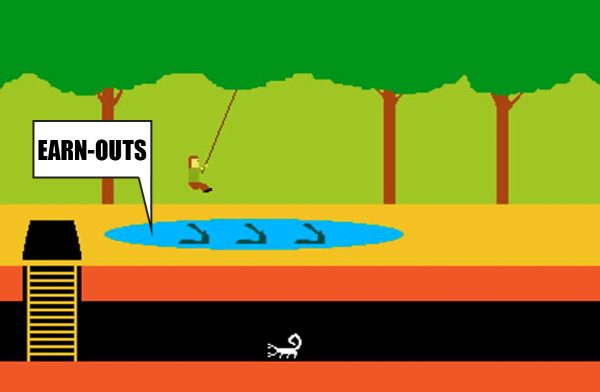
One of the most common pitfalls when selling a business is the “Earn-Out” 😮
If you’re a business owner and haven’t heard of that phrase before, chances are you’d have fallen into that pit, too!
Hopefully I’m throwing you a vine after this post.
So… what’s an earn-out?
To simplify, it’s a bonus that the interested buyer of your company offers you. It’s based on the continued growth and performance of your business, usually for the next 1-3 years after you sell it to them.
Typically these earn-out bonuses are based on forecasted revenue or profit growth, or at the very least – a reward for no decline in your current business financials.
An example would be if your company achieved 10% growth in the first year, you’d be rewarded by some set amount. There’d be another bonus in year two, if your company achieved the goals agreed on. Usually these goals increase each year.
These earn-outs can be large numbers. Even for a smaller business these can often be six or seven figure potential bonuses, if the goals are achieved.
Most legit business owners see these goals and can quickly assess if they have the potential to achieve the goals, based on the financial data they currently have. Many times, these earn-out goals seem very achievable.
So, the seller signs the offer to sell their business, usually with some lump-sum in cash up front, sometimes including shares or minority equity in the business, and the earn-out bonuses.
All of this ~sounds~ amazing at the time. So what’s the big pitfall? ⚠️
The biggest risk occurs when you realize as a seller that you no longer have control over the outcome of those forecasted earn-out goals.
Then you have earn-out goals (and your bonuses) competing directly with the net profit of business, under new ownership.
Sometimes new owners may underperform on achieving these earn-out goals, in order to maximize their own profit during that 1-3 year earn-out phase.
Here’s an example of how this plays out. Take notes.
Let’s say you have a potential earn-out bonus of $500K based on your former company achieving 10% more revenue.
The internal discussion at your former company between the CEO and accounting team reads this more like this:
“Hey, company growth is great, but does it make sense for us to shoot for that 10% goal, if we have to pay out $500K to the seller? Do we earn enough profit in that extra 10% to warrant the effort?”
What if the company only increases it’s net profit by $300K by achieving that 10% growth? Then they have to pay out $500K, which nets them a $200K loss for the effort.
….Maybe it’s easier for them to only hit 9% growth, earn $290K more… and not have to pay the earn-out bonus.
They just went from losing -$200K to earning $290K, which is a $490K positive swing.
All for doing “less”.
The sellers never see it coming. It’s often a surprise at the end of the year. I’ve felt the sting, myself.
There are a few ways to minimize the risk of earn-outs, but oftentimes the buyer will push back on negotiating them – because they understand it’s a buyer’s tactic.
My take? Consider earn-outs as icing on the deal cake. Focus more on baking the awesome cake in the structure of your deal, and consider the icing as optional, and not part of your decision-making process to sell the company. Consider earn-outs as zero, unless that wire transfer comes in.
-Tony
